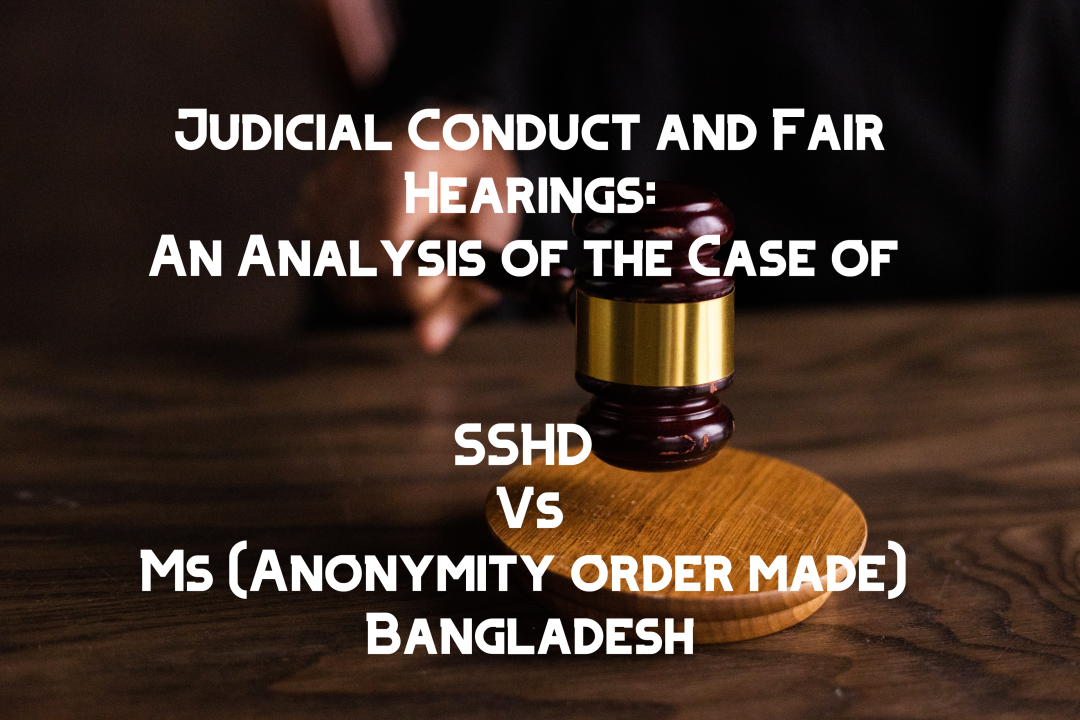In all my years of practice, I have never come across a case that was addressed by the Upper Tribunal for judicial bias, therefore leading to a ruling that the previous judge erred in law. Of course, this is not common, but in SSHD vs. Ms. (anonymity order made) Bangladesh [2023] UKUT 00114, this happened. One of the reasons I am writing this is to shed some light on the court and tribunal procedures. This case shows that if the legal representative feels that there was bias or unfairness during the course of the hearing (which happens very rarely), it can be successfully challenged.
The principles of fairness and impartiality lie at the core of any judicial system. Judges are entrusted with the responsibility of conducting hearings that ensure justice and protect the rights of all parties involved. However, when judicial conduct becomes overbearing and intimidatory, it can jeopardise the fairness of the proceedings and create an impression of bias. In this article, I will analyse a recent case, SSHD Vs Ms (Anonymity order made) Bangladesh [2023] UKUT 00114, in light of the principles established in Porter v Magill [2001] UKHL 67, highlighting the importance of maintaining a fair and unbiased hearing environment.
I strongly advise that you read the whole judgement.
Factual Background of the Case:
The appellant arrived in the UK on 2 May 2011 with leave to enter as a Tier 4 migrant. He unsuccessfully applied for further leave outside the Immigration Rules and an EEA residence card. On 16 February 2017, he was deemed to be an overstayer and applied for asylum. His protection claim was initially refused by the Secretary of State but was reconsidered and refused again. The respondent accepted that the appellant was a member of the BNP in Bangladesh, but not that he was ever politically active there. The respondent placed no weight on the First Information Reports (FIRs) provided and concluded that the appellant would not face a risk of ill-treatment on return to Bangladesh.
The hearing before the First-tier Tribunal was scheduled for two days, 8 and 11 October 2021. The appeal had been adjourned on multiple occasions due to the appellant’s bundle not being available. Cross-examination of the appellant began on 8 October but was not completed. When the appeal resumed on 11 October, the Home Office Presenting Officer (HOPO) withdrew from the case. The appellant was informed that his appeal was allowed.
The SSHD filed for permission to appeal to the Upper Tribunal on the basis that The First-tier Tribunal erred in permitting procedural irregularities, including bias, limited cross-examination, and failure to adjourn when the HOPO raised issues of safety because the appellant reached for the HOPO on LinkedIn and tried to connect with him.
Porter v Magill test
The test was laid down by Lord Hope of Craighead i.e. Regardless of the appropriateness of judicial interventions, overbearing and intimidatory conduct, directed at a representative, could result in an unfair hearing as well as give the impression of bias to a fair-minded and informed observer.
Historically the original of this test can be traced back to the R v Gough. “the reasonable apprehension of bias” test, was in line with that adopted in most common law jurisdictions. It is also in line with that which the Strasbourg court has adopted, which looks at the question of whether there was a risk of bias objectively in the light of the circumstances which the court has identified.
In the case of Porter Vs Magill Land Hope Craighead considered the test “When the Strasbourg jurisprudence is taken into account, we believe that a modest adjustment of the test in R v Gough is called for, which makes it plain that it is, in effect, no different from the test applied in most of the Commonwealth and Scotland. The court must first ascertain all the circumstances which have a bearing on the suggestion that the judge was biased. It must then ask whether those circumstances would lead a fair-minded and informed observer to conclude that there was a real possibility, or a real danger, the two being the same, that the tribunal was biased.”. However, we made an adjustment and deleted the words “a real danger”.
The Role of the Judge:
An essential aspect of a judge’s responsibility is to conduct proceedings in a manner that permits the best presentation of arguments and evidence by all parties. This strategy creates a favourable environment for the judge to reach a high-quality decision and ensures the administration of justice. The judge must balance control of the proceedings with attentiveness, direction, and forbearance. However, it is necessary to strike a balance to prevent overstepping boundaries, which could result in an unfair hearing.
The Impact of Judicial Conduct on Fairness:
In SSHD Vs Ms (Anonymity order made) Bangladesh [2023] UKUT 00114, evidently, the judge’s behaviour during the First-Tier Tribunal hearing raised questions regarding impartiality and procedural fairness. The judge’s behaviour towards the Home Office Presenting Officer (HOPO) was described as domineering and intimidating, creating an environment that could create the appearance of partiality. This directly contradicts the principles established in Porter v. Magill, which emphasised that a decision founded on an unfair hearing cannot be upheld.
Instances of Apparent Bias:
Throughout the hearing, the judge’s comments and interactions with the HOPO revealed a predetermined opinion regarding the appeal’s outcome. The judge’s remarks implied a lack of objectivity and a tendency to favour the appellant. The imposition of opinions and attempts to explain inconsistencies in the appellant’s evidence was more reminiscent of advocacy than of a neutral evaluation of the case. In addition, the judge’s willingness to accept additional evidence and requests from the appellant’s attorney added to the impression of bias.
Procedural Unfairness:
During the hearing in SSHD Vs Ms (Anonymity order made), procedural injustice was also a source of concern. The judge granted the appellant’s attorney’s unlawful motion to influence the tribunal’s course of action. Not only did this compromise the impartiality of the proceedings, but it also gave the appearance of collusion against the HOPO. These actions undermine the legitimacy of the judicial system and the confidence of the parties involved.
Finally, the case of SSHD Vs Ms (Anonymity order made) Bangladesh [2023] UKUT 00114 serves as a reminder of the vital importance of judicial conduct in ensuring fair hearings. While judges must retain control over proceedings, it is equally crucial to remain impartial, attentive, and patient. Overbearing and intimidatory conduct, as demonstrated in this case, can taint the fairness of the hearing and create an impression of bias. Upholding the principles established in Porter v Magill [2001] UKHL 67 is essential to maintain the integrity and credibility of the judiciary. By conducting hearings that provide equal opportunities for all participants, judges can contribute to the delivery of justice and the attainment of high-quality decisions.
Also, I would say this case provides another lesson where lawyers have to be more mindful and advise our clients not to do anything that gives the HOPO a reason to fear for their personal safety. Like in this case, the appellant searched the HOPO on LinkedIn and tried to connect with him. This is a serious matter. More often than not, the cases we deal with last for 1/2 hour, and the client meets the HOPO for the first time during the hearing. Despite that, we must advise the clients not to make such mistakes, e.g., trying to connect with the HOPO or the case worker on social media.
Disclaimer: This article is for informational purposes only and should not be construed as legal advice.



